Online Professional Learning:
Improving High School Science Education Through Literacy Support
iRAISE – Internet-Based Reading Apprenticeship Improving Science Education – was awarded a three-year Investing in Innovation (i3) grant from the U.S. Department of Education to develop and test an online version of the rigorously researched face-to-face Reading Apprenticeship Improving Secondary Education (RAISE) model of Reading Apprenticeship professional development.
The primary goal of the three-year effort was to provide an online, cost-effective professional learning alternative to the large numbers of high school Biology, Chemistry, Earth Science, and Physics teachers who may not otherwise have the opportunity to bring Reading Apprenticeship practices to their classrooms.
The second goal of the course was to help science teachers change the way they teach by increasing students’ engagement in subject area reading and their comprehension of complex science texts.
The final goal was to give students the “power to figure things out” more easily, and to enable students to embrace the content of the Next Generation Science Standards (NGSS).
Please note that the iRAISE project has concluded, but educators looking for an online learning experience with Reading Apprenticeship can find information about our online courses on our Services page.
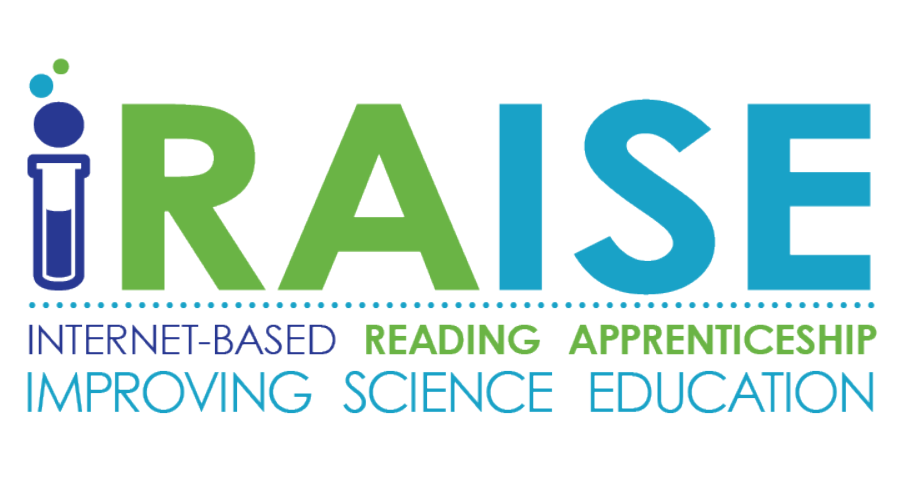
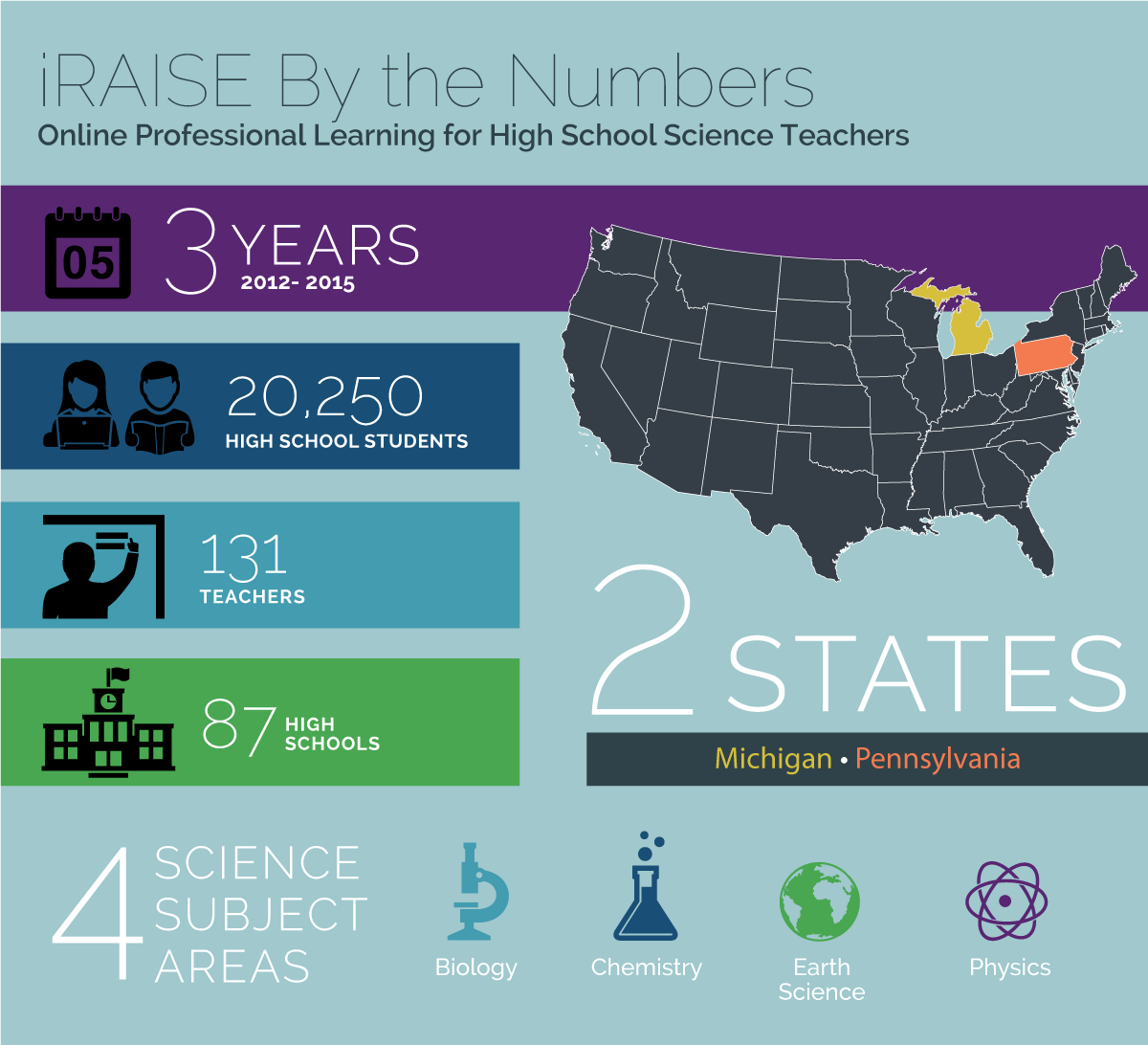
iRAISE By the Numbers
Blended Professional Learning for Middle School Teachers
- 3 years: 2012-2015
- 20,250 high school students
- 131 teachers
- 87 high schools
- 2 states: Michigan, Pennsylvania
- 4 science subject areas: biology, chemistry, earth science, physics
Praise from iRAISE participants
I am seeing some completely new behavior in my classroom lately. Students are looking up things they are curious about in the Chemistry book without being told to do so. I am hearing statements like “I remember reading about that in the book…”
— Stephen Hall, Chemistry teacher
Hamady High School
Michigan“My kids are WILLINGLY looking for info in their textbooks. Its so cool to watch!”
— Terri Kelsey, Physics teacher
Mountain View High School
Pennsylvania“I think that we all have learned so much about how to increase literacy, as well as changing (improving) how we teach. This course has provided so much useful information and techniques.”
— Rebecca Georgia-Emiliani, Science teacher
West Scranton High School
Pennsylvania
Fostering a Community, Online
How do you get science teachers to think, reflect, work as a group, and eventually change their teaching practices, using an online model that includes group and individual work?
Ideally, you build a sense of community and trust that allows teachers to share their challenges and successes with each other. We learned that doing so can help teachers maintain their engagement in the course and enrich their own work by learning from their colleagues.
By providing different modes of online interaction with the Reading Apprenticeship curriculum, the iRAISE project cultivated a strong sense of community that helped Michigan and Pennsylvania science teachers increase students’ engagement in their reading and understanding of complex science texts.
Reading Apprenticeship instructional designers and teacher design partners engaged in iterative cycles of developing, piloting, and field-testing the 65-hour online course, and received feedback from attendees throughout the effort.
Teachers found that collaborating online with fellow teachers kept them engaged in the course and brought about encouraging results in student work.
The Professional Learning Experience
Here are some of the activities and tools used in the 65-hour online course:
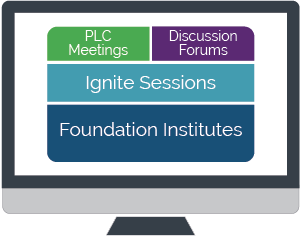
The Foundation Institutes consisted of 20-hours of synchronous online sessions occurring during one week in the summer that used a platform called Blackboard Collaborate. These large-group sessions provided an immersion into the Reading Apprenticeship framework and learning community.
Ignite sessions were two-hour synchronous online sessions occurring once each month during the school year that also used Blackboard Collaborate. These large-group sessions provided new learning and practice for participants.
PLCs, or Professional Learning Communities, were one-hour synchronous online sessions occurring once each month during the school year, using Blackboard Collaborate or Google Hangouts. These small-group sessions allowed participants to share their classroom practice and trouble-shoot implementation.
Discussion Forums were asynchronous and took place on Canvas, our learning management system, each month during the school year. These forums supported participants’ professional reading and further inquiry into Reading Apprenticeship.
Sustaining Collaboration
We used the following interactive platforms to encourage teacher participation and collaboration:
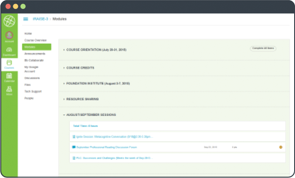
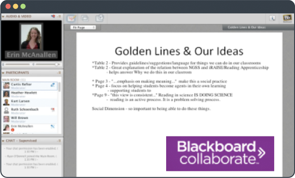
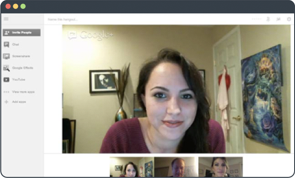
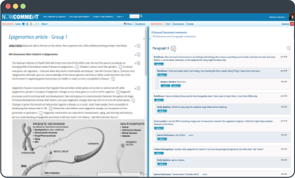
Conclusion
Feedback from iRAISE participants was overwhelmingly positive. Teachers experienced a change in their own teaching that reinforced student independence, and saw more proactive, independent reading behavior in their students.
We learned that we can create a strong sense of community in the online space, something that is notably challenging to do. Teachers in the iRAISE course reported feeling connected to each other, especially in the smaller Professional Learning Community (PLC) groups.
One teacher commented in her feedback about PLC meetings, “It is great to share ideas—as teachers. We do not get to do that enough. Also, this sharing and reinforcement and feedback boosts our confidence level that we are on the right track.”
Please note that the iRAISE project has concluded, but educators looking for an online learning experience with Reading Apprenticeship can find information about our online courses on our Services page.
Evaluation Findings
Empirical Education Inc., the independent evaluator for the iRAISE i3 development grant, conducted a randomized control trial (RCT) during the 2014-2015 school year. Their conclusion is as follows:
After a one-year implementation with iRAISE, we do not find an overall effect of the program on student achievement [on a standardized assessment]. However, we do find that levels of incoming reading achievement moderate the impact of iRAISE on general reading literacy such that lower scoring students benefit more from the program.
Additionally, we found a positive effect on several classroom instructional practice outcomes. This finding supports the basic goal of iRAISE: to provide the same Professional Development value in a less expensive, and (for some) more accessible modality. Teachers self-reported that they did change their classroom practice as a result of the iRAISE program and that impacts of iRAISE were greater for students who were performing at lower levels of incoming achievement.
Reference this report: Jaciw, A. P., Schellinger, A., Lin, L., Zacamy, J., & Toby, M. (2016). Effectiveness of Internet-Based Reading Apprenticeship Improving Science Education (iRAISE): A Report of a Randomized Experiment in Michigan and Pennsylvania. (Empirical Education Rep.No. Empirical_ iRAISE-7027-FR1-Y2-O.3). Palo Alto, CA: Empirical Education Inc. Retrievable here.

